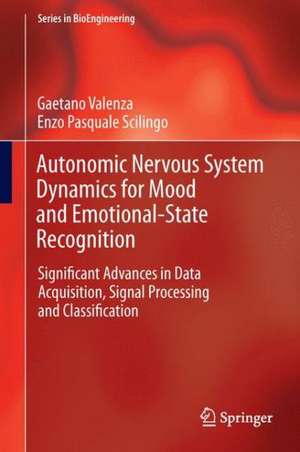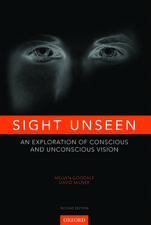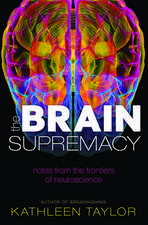Autonomic Nervous System Dynamics for Mood and Emotional-State Recognition: Significant Advances in Data Acquisition, Signal Processing and Classification: Series in BioEngineering
Autor Gaetano Valenza, Enzo Pasquale Scilingoen Limba Engleză Hardback – 12 noi 2013
| Toate formatele și edițiile | Preț | Express |
|---|---|---|
| Paperback (1) | 709.72 lei 6-8 săpt. | |
| Springer International Publishing – 23 aug 2016 | 709.72 lei 6-8 săpt. | |
| Hardback (1) | 716.45 lei 6-8 săpt. | |
| Springer International Publishing – 12 noi 2013 | 716.45 lei 6-8 săpt. |
Din seria Series in BioEngineering
- 15%
 Preț: 576.89 lei
Preț: 576.89 lei - 5%
 Preț: 995.70 lei
Preț: 995.70 lei - 5%
 Preț: 1164.31 lei
Preț: 1164.31 lei - 5%
 Preț: 720.84 lei
Preț: 720.84 lei - 15%
 Preț: 643.65 lei
Preț: 643.65 lei - 5%
 Preț: 729.98 lei
Preț: 729.98 lei - 5%
 Preț: 711.88 lei
Preț: 711.88 lei - 5%
 Preț: 1104.48 lei
Preț: 1104.48 lei - 5%
 Preț: 1432.38 lei
Preț: 1432.38 lei - 5%
 Preț: 1413.56 lei
Preț: 1413.56 lei - 5%
 Preț: 1100.09 lei
Preț: 1100.09 lei - 5%
 Preț: 1289.76 lei
Preț: 1289.76 lei - 5%
 Preț: 727.08 lei
Preț: 727.08 lei - 5%
 Preț: 1299.81 lei
Preț: 1299.81 lei - 5%
 Preț: 719.02 lei
Preț: 719.02 lei - 5%
 Preț: 1166.49 lei
Preț: 1166.49 lei - 5%
 Preț: 724.29 lei
Preț: 724.29 lei - 15%
 Preț: 639.90 lei
Preț: 639.90 lei - 5%
 Preț: 1288.99 lei
Preț: 1288.99 lei - 18%
 Preț: 726.37 lei
Preț: 726.37 lei - 5%
 Preț: 1048.90 lei
Preț: 1048.90 lei - 5%
 Preț: 1164.10 lei
Preț: 1164.10 lei - 5%
 Preț: 1165.40 lei
Preț: 1165.40 lei - 5%
 Preț: 714.46 lei
Preț: 714.46 lei - 5%
 Preț: 1150.98 lei
Preț: 1150.98 lei - 5%
 Preț: 643.87 lei
Preț: 643.87 lei - 5%
 Preț: 1291.57 lei
Preț: 1291.57 lei - 15%
 Preț: 638.57 lei
Preț: 638.57 lei
Preț: 716.45 lei
Preț vechi: 754.15 lei
-5% Nou
Puncte Express: 1075
Preț estimativ în valută:
137.10€ • 146.60$ • 114.31£
137.10€ • 146.60$ • 114.31£
Carte tipărită la comandă
Livrare economică 18 aprilie-02 mai
Preluare comenzi: 021 569.72.76
Specificații
ISBN-13: 9783319026381
ISBN-10: 3319026380
Pagini: 184
Ilustrații: XIX, 162 p. 49 illus., 36 illus. in color.
Dimensiuni: 155 x 235 x 16 mm
Greutate: 0.44 kg
Ediția:2014
Editura: Springer International Publishing
Colecția Springer
Seria Series in BioEngineering
Locul publicării:Cham, Switzerland
ISBN-10: 3319026380
Pagini: 184
Ilustrații: XIX, 162 p. 49 illus., 36 illus. in color.
Dimensiuni: 155 x 235 x 16 mm
Greutate: 0.44 kg
Ediția:2014
Editura: Springer International Publishing
Colecția Springer
Seria Series in BioEngineering
Locul publicării:Cham, Switzerland
Public țintă
ResearchCuprins
Emotions and Mood States: Modeling, Elicitation, and Classification through Autonomic Patterns.- Gathering Data from the Autonomic Nervous System: Experimental Procedures and Wearable Monitoring Systems.- Methodology of Advanced Signal Processing and Modeling.- Experimental Evidences on Healthy Subjects and Bipolar Patients.- Discussion on mood and emotional-state recognition using the Autonomic Nervous System Dynamics.- Summary of the Book and Direction for Future Research.
Notă biografică
Associate Professor Scilingo has worked for several years in the field of wearable monitoring systems, signal processing, human-computer interfaces and biomedical applications. He is author of hundreds of international scientific contributions in these fields and currently he is coordinating a European project focused on personalized health systems for mental care. More specifically, patients suffering from mood disorders are monitored by means of wearable systems acquiring a wide set of physiological signals and other behavioural and environmental parameters. Most of the results reported in this book are achieved within the framework of this project, through which Doctor Valenza has been focusing on statistical and nonlinear biomedical signal processing, cardiovascular and neural modeling, and wearable systems for physiological monitoring.
He is author of tens of international scientific papers in these fields and currently he is working with the University of Pisa (Italy), and the neuro-cardiovascular signal processing unit of the Massachusetts General Hospital, Harvard Medical School, Boston, (MA, USA), and Massachusetts Institute of Technology, Cambridge, (MA, USA).
He is author of tens of international scientific papers in these fields and currently he is working with the University of Pisa (Italy), and the neuro-cardiovascular signal processing unit of the Massachusetts General Hospital, Harvard Medical School, Boston, (MA, USA), and Massachusetts Institute of Technology, Cambridge, (MA, USA).
Textul de pe ultima copertă
This monograph reports on advances in the measurement and study of autonomic nervous system (ANS) dynamics as a source of reliable and effective markers for mood state recognition and assessment of emotional responses. Its primary impact will be in affective computing and the application of emotion-recognition systems.
Applicative studies of biosignals such as:
Nonlinear signal processing techniques play a crucial role in understanding the ANS physiology underlying superficially noticeable changes and provide important quantifiers of cardiovascular control dynamics. These have prognostic value in both healthy subjects and patients with mood disorders. Moreover, Autonomic Nervous System Dynamics for Mood and Emotional-State Recognition proposes a novel probabilistic approach based on the point-process theory in order to model and characterize the instantaneous ANS nonlinear dynamics providing a foundation from which machine “understanding” of emotional response can be enhanced.
Using mathematics and signal processing, this work also contributes to pragmatic issues such as emotional and mood-state modeling, elicitation, and non-invasive ANS monitoring. Throughout the text a critical review on the current state-of-the-art is reported, leading to the description of dedicated experimental protocols, novel and reliable mood models, and novel wearable systems able to perform ANS monitoring in a naturalistic environment.
Biomedical engineers will find this book of interest, especially those concerned with nonlinear analysis, as will researchers and industrialtechnicians developing wearable systems and sensors for ANS monitoring.
Applicative studies of biosignals such as:
- electrocardiograms;
- electrodermal responses;
- respiration activity;
- gaze points; and
- pupil-size variation
Nonlinear signal processing techniques play a crucial role in understanding the ANS physiology underlying superficially noticeable changes and provide important quantifiers of cardiovascular control dynamics. These have prognostic value in both healthy subjects and patients with mood disorders. Moreover, Autonomic Nervous System Dynamics for Mood and Emotional-State Recognition proposes a novel probabilistic approach based on the point-process theory in order to model and characterize the instantaneous ANS nonlinear dynamics providing a foundation from which machine “understanding” of emotional response can be enhanced.
Using mathematics and signal processing, this work also contributes to pragmatic issues such as emotional and mood-state modeling, elicitation, and non-invasive ANS monitoring. Throughout the text a critical review on the current state-of-the-art is reported, leading to the description of dedicated experimental protocols, novel and reliable mood models, and novel wearable systems able to perform ANS monitoring in a naturalistic environment.
Biomedical engineers will find this book of interest, especially those concerned with nonlinear analysis, as will researchers and industrialtechnicians developing wearable systems and sensors for ANS monitoring.
Caracteristici
Demonstrates methods useful for engineers and computer scientists in increasing the ability of machines to monitor and recognize human emotional states Design of wearable monitoring systems will help clinicians to assess the mental and emotional state of their patients Facilitates the study of physiological changes associated with normal and abnormal changes in affect Includes supplementary material: sn.pub/extras














